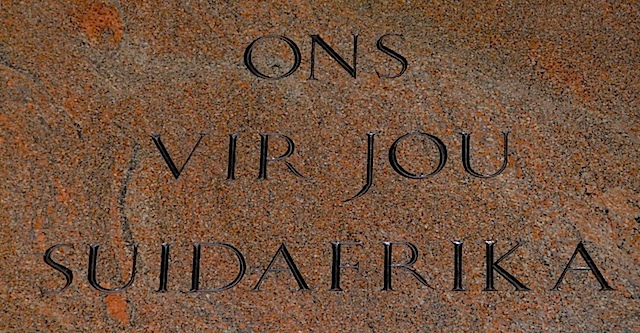 |
Die Stem van Suid Afrika |
| www.boerafrikana.com: Tuisblad > Die Stem |
| 1ste |
Die Stem van Suid Afrika Uit die blou van onse hemel, uit die diepte van ons see,
Ons sal antwoord op jou roepstem, ons sal offer wat jy vra:
In die merg van ons gebeente, in ons hart en siel en gees,
Vaderland! ons sal die adel van jou naam met ere dra:
In die songloed van ons somer, in ons winternag se kou,
Op jou roep se ons nooit nee nie, se ons altyd, altyd ja:
Op U Almag vas vertrouend het ons vadere gebou:
Soos ons vadere vertrou het, leer ook ons vertrou, o Heer -
Die Stem van Suid-Afrika (English: The Call of South Africa was the national anthem of South Africa from 1957 to 1994. In May 1918, C.J. Langenhoven wrote an Afrikaans poem called Die Stem, for which music was composed by the Reverend Marthinus Lourens de Villiers in 1921. It was widely used by the South African Broadcasting Corporation in the 1920s, which played it at the close of daily broadcasts, along with God Save the King. It was sung publicly for the first time on 31 May 1928. It was not translated into English until 1952, while God Save the Queen did not cease to have official status until 1957. The poem originally had only three verses, but the government asked the author to add a fourth verse with a religious theme. The anthem speaks throughout of commitment to the Vaderland (father land) and to God. However, the anthem was generally disliked by black South Africans, who saw it as triumphalist and associated it with the apartheid regime where one verse shows dedication to Afrikaners. As the dismantling of apartheid began in the early 1990s, South African teams were readmitted to international sporting events, which presented a problem as to the choice of national identity South Africa had to present. Die Stem was sung at a rugby union test match against New Zealand in 1992, which angered the African National Congress, since they had not been consulted on the choice of anthem. The ANC afterwards insisted that Die Stem should not be used as anthem, and at the 1992 Summer Olympics in Barcelona that year, Schiller's Ode to Joy, as set to Beethoven's music (same as Rise O Voices of Rhodesia), was used instead, along with a neutral Olympic flag. (http://en.wikipedia.org/wiki/Die_Stem visited 10/11/2010)
|
3de |
Hoofblad
